ova export not functional
-
Hi, I have been evaluating XCP-ng and Xen Orchestra (Community Edition) for a couple of weeks and I'm really enjoying it. I have one issue that I can't seem to find a way to solve, however. I can import VMs that I have previously created using VMware with no problems and I can create new VMs in Xen Orchestra. But when I try and export using OVA (because there are times when I still need to use a VM I have created locally on my laptop to interface with devices that I can't connect to a server) the file downloads without any issues but I cannot get it to work with VMware or VirtualBox. VMware just fails to import with an unknown fault. VirtualBox gives me an error
Error reading OVA
(VERR_TAR_BAD_CHKSUM_FIELD)
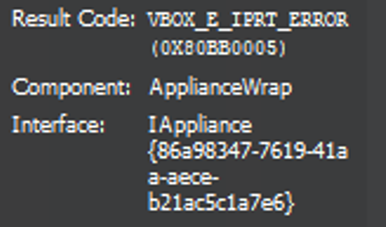
I've tried extracting the OVA to OVF format and it also failed.
I have also tried exporting just the vdi file in vmdk format and recreating the VM locally using VMware workstation and that also failed.
I'm really eager to use this product more but I can't really proceed unless I have a reliable way to also use the VMs on a local machine. Any help would be greatly appreciated.
-
 O olivierlambert moved this topic from Xen Orchestra on
O olivierlambert moved this topic from Xen Orchestra on
-
@florent I was recently able to test the .ova export again and I was pleased to find that it worked without the errors we had been experiencing. I'm not sure if this is something that I should be putting in a new topic but the only thing now stopping me is that for some reason I cannot get the network drivers to work on a brand new Win10 VM. I exported a working Win10 VM from my local VMware workstation. I then imported it into XCP-ng using the latest version of Xen Orchestra and it worked as expected. I then tried exporting as .ova from Xen orchestra without installing Citrix drivers (and then tried a test with the Cirtrix drivers installed), but after importing back into VMware I couldn't get any network options to work except a 3rd party USB to Ethernet adaptor.
Thanks in advance if you have any advice.
-
Hi,
Thanks for the feedback, anyone can confirm a similar behavior? Also @gasky are you 100% up to date? Can you reproduce with XOA on latest release channel?
-
@gasky said in ova export not functional:
VERR_TAR_BAD_CHKSUM_FIELD
Hi,
I tested locally with the latest xoa version, and virtual box 6.1 it seems okCan you rename the ova to tar, and try to export it ? Is there only one problematic VM, or do all the VM fails ? Would it be ok to give access to the generated ova file ?
Regards
Florent
-
export Rocky Linux VM with ova and input into VirtualBox 7.0 all is ok, except the fact that I need to configure Video and Linux version
-
Hi, so I signed up for a free trial of XOA to test if it was an issue with the Community version (or my setup of it) but I am getting the same results. I have tried it with Windows 10, 11 and Server 22 also with Ubuntu.
The version of XOA is:
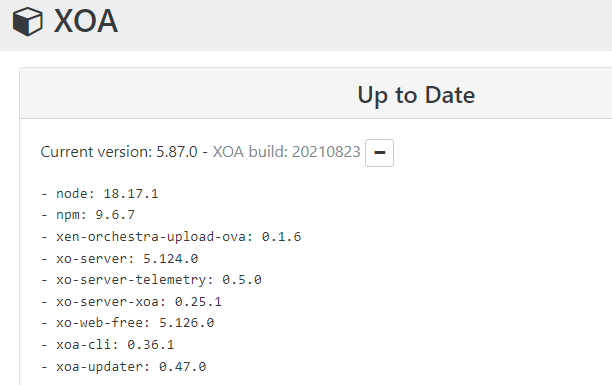
If I try to open the OVA file directly using VMware (which would be my first choice for when I need to use VMs locally) I get one of the 2 following errors:
This one when using XOA and a clean install of Windows server 22:
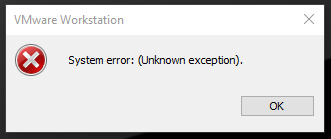
This one when using XO Community version and a clean install of Windows 10:
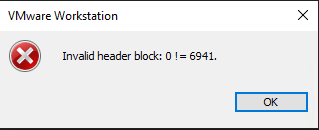
When I make the OVA file a TAR file and extract it using 7zip I get the following error:
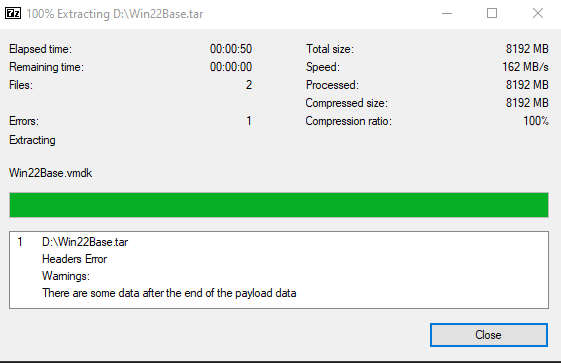
I'm using Chrome to do the export. The VMs are brand new and created in Xen Orchestra.
I tried with and without Citrix PV drivers installed and found no difference.
I've also tried this on multiple different platforms. So I have a setup at home that I'm running on an old PC and using the Docker installation provided by https://hub.docker.com/r/ronivay/xen-orchestra. At work I have tried the Docker version, I've tried creating a Ubuntu VM on the XCP-ng host and compiled the community version of Xen Orchestra and then I've also tried XOA via the quick deploy. So far I am having the same issue on all of them.
I'm using XCP-ng host 8.2.1 but I have also tried the latest beta version and found the same issue.
I'm using VMware Workstation v16.2.5 and Virtualbox v7.0.12
Here is a Windows 10 VM I just created without any license for testing that I can share. I've shared it using Google drive as that is what I have available but if you want to access it you will need to request access so that I can approve. https://drive.google.com/file/d/1sIyjs0ldpn60pN5xBXUKYFa45VqLFu7a/view?usp=drive_link
Thanks,
-
@gasky thansk, I sent you an email
-
With ova from you I get the error
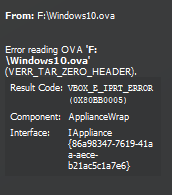
Edit:
The problem with ova is only on windows export, with linux export all is ok. -
@gasky
Does a xva export and then import works ? If yes could you give me the xva corresponding to this ova ? -
Hi, thanks again for your help.
So I have also tried using the OVA with a Ubuntu machine and had the same error (I have uploaded that OVA file to the drive folder).
I did what you suggested with the XVA file and yes it successfully exported (with compression disabled - the only one I tried) and then imported back into another instance of XCP-ng. I have included the XVA file in the drive folder also.
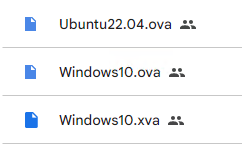
I hope this helps to get to the root cause of the error.
Thanks,
-
@gasky that is a good thing that the xva export / import works : this probbaly a bug in the OVA export, not on the XCP side or a problem on your storage
I am downloading the image right now and will look for a solution
-
I have the same thing with OVA of windows VM, on linux VM all is ok.
Import is done on VirtualBox 7 -
-
Linux, yes. Windows has by default 15Gb+, maybe core one has less
EDIT:
Windows 2022 Core, it works
Size on VHD,

Rocky Linux 9, it works
Size on VHD

-
Sorry, I don't have any VMs that small. But if I understand correctly from @Gheppy it seems the issue is related to the VMs size?
-
It might be this. @florent is the opportunity to make them test your branch

-
@olivierlambert yes, as soon as my branch is working as intended
For now I can generate a valid tar (with pax header) , but virtual box don't like it
-
could you try this branch : fix_re_re_ova_export (PR is https://github.com/vatesfr/xen-orchestra/pull/7183/files ) ?
don't forget to do a yarn install before relaunching xo, since we updated a dependency
-
Windows 22h2 ova is exported fine. The import goes to the end only if:
- it is not set to EFI boot by default
- the type of Operating System is on Other and the version is Other/Unknown
- video is under 16Mb
Linux ova export is fine. The import goes to the end with the same missconfiguration.
After the settings are done everything works fine.
Size of ova

-
@Gheppy yes
at least if fixes import \o/
I am creatig card in the backlog to improve the import. Could you extract the ovf file of the windows ova ( rename it to tar and extract it) , and send it to me or post in in the forum ( it should not contains any confidential information )
-
this is the metadata.ovf
<?xml version="1.0" encoding="UTF-8"?> <!--Generated by Xen Orchestra--> <ovf:Envelope xmlns="http://schemas.dmtf.org/ovf/envelope/1" xmlns:ovf="http://schemas.dmtf.org/ovf/envelope/1" xmlns:rasd="http://schemas.dmtf.org/wbem/wscim/1/cim-schema/2/CIM_ResourceAllocationSettingData" xmlns:vssd="http://schemas.dmtf.org/wbem/wscim/1/cim-schema/2/CIM_VirtualSystemSettingData"> <References> <File ovf:href="w10-22h2_sda.vmdk" ovf:id="file1"/> </References> <DiskSection> <Info>Virtual disk information</Info> <Disk ovf:capacity="51200" ovf:capacityAllocationUnits="byte * 2^20" ovf:diskId="vmdisk1" ovf:fileRef="file1" ovf:format="http://www.vmware.com/interfaces/specifications/vmdk.html#streamOptimized" /> </DiskSection> <NetworkSection> <Info>The list of logical networks</Info> <Network ovf:name="LAN0-1Gb"/> </NetworkSection> <VirtualSystem ovf:id="w10-22h2"> <Info>A virtual machine</Info> <Name>w10-22h2</Name> <OperatingSystemSection ovf:id="1"> <Info>The kind of installed guest operating system</Info> </OperatingSystemSection> <VirtualHardwareSection> <Info>Virtual hardware requirements</Info> <System> <vssd:ElementName>Virtual Hardware Family</vssd:ElementName> <vssd:InstanceID>0</vssd:InstanceID> <vssd:VirtualSystemIdentifier>w10-22h2</vssd:VirtualSystemIdentifier> <vssd:VirtualSystemType>vmx-11</vssd:VirtualSystemType> </System> <Item> <rasd:AllocationUnits>hertz * 10^6</rasd:AllocationUnits> <rasd:Description>Number of Virtual CPUs</rasd:Description> <rasd:ElementName>4 virtual CPU(s)</rasd:ElementName> <rasd:InstanceID>1</rasd:InstanceID> <rasd:ResourceType>3</rasd:ResourceType> <rasd:VirtualQuantity>4</rasd:VirtualQuantity> </Item> <Item> <rasd:AllocationUnits>byte * 2^20</rasd:AllocationUnits> <rasd:Description>Memory Size</rasd:Description> <rasd:ElementName>4096MB of memory</rasd:ElementName> <rasd:InstanceID>2</rasd:InstanceID> <rasd:ResourceType>4</rasd:ResourceType> <rasd:VirtualQuantity>4096</rasd:VirtualQuantity> </Item> <Item> <rasd:Address>0</rasd:Address> <rasd:Description>IDE Controller</rasd:Description> <rasd:ElementName>VirtualIDEController 0</rasd:ElementName> <rasd:InstanceID>4</rasd:InstanceID> <rasd:ResourceType>5</rasd:ResourceType> </Item> <Item ovf:required="false"> <rasd:AutomaticAllocation>false</rasd:AutomaticAllocation> <rasd:ElementName>VirtualVideoCard</rasd:ElementName> <rasd:InstanceID>5</rasd:InstanceID> <rasd:ResourceType>24</rasd:ResourceType> </Item> <Item> <rasd:AddressOnParent>0</rasd:AddressOnParent> <rasd:ElementName>Hard Disk 1</rasd:ElementName> <rasd:HostResource>ovf:/disk/vmdisk1</rasd:HostResource> <rasd:InstanceID>vmdisk1</rasd:InstanceID> <rasd:Parent>4</rasd:Parent> <rasd:ResourceType>17</rasd:ResourceType> </Item> <Item> <rasd:AddressOnParent>0</rasd:AddressOnParent> <rasd:AutomaticAllocation>true</rasd:AutomaticAllocation> <rasd:Connection>LAN0-1Gb</rasd:Connection> <rasd:Description>PCNet32 ethernet adapter on "LAN0-1Gb"</rasd:Description> <rasd:ElementName>Connection to LAN0-1Gb</rasd:ElementName> <rasd:InstanceID>nic0</rasd:InstanceID> <rasd:ResourceSubType>PCNet32</rasd:ResourceSubType> <rasd:ResourceType>10</rasd:ResourceType> </Item> </VirtualHardwareSection> <AnnotationSection ovf:required="false"> <Info>A human-readable annotation</Info> <Annotation>w10-22h2</Annotation> </AnnotationSection> </VirtualSystem> </ovf:Envelope>